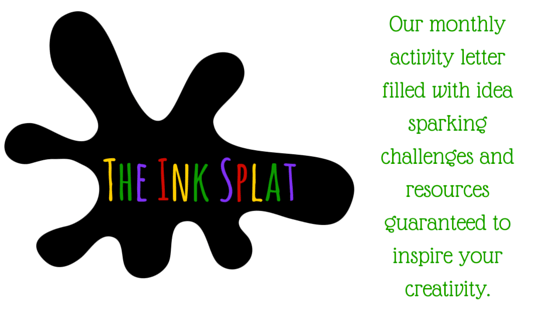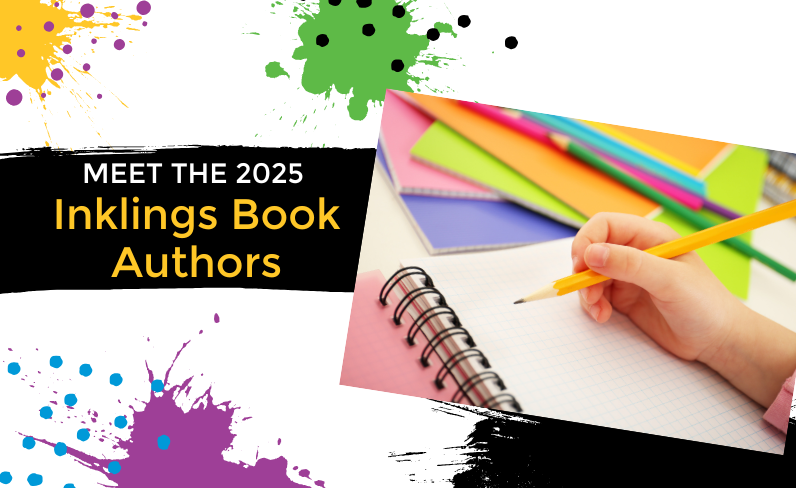Hello Inklings!
This month’s Ink Splat Author Interview features Inklings authors! These youth, ages 8-18, will be published in our upcoming book releases this September. Our Inklings Book 2025 features youth in third through eighth grade, and our Inklings Book 2025: Teen Edition features ninth-twelfth graders.
In our live interview, these inspiring authors gave our community a glimpse inside their creative process. They shared about what inspired their stories and poems, how they planned and drafted their pieces, how they tackled creative blocks, and strategies they used for revision. We’ve included highlights here for you to enjoy. Creativity is contagious, and we’re sure you’ll catch it while reading this interview!
Learn more about the Inklings Book Contest here.

Writing Challenge
The Sound of a Feeling
In our Inklings Book interview, William Manche shared the experience of creating a poem that allowed readers to feel an experience, like they were standing right in the middle of it.
What memorable experience have you had this summer? How might you use sensory details–sounds, sensations, scents–to share not just what that experience was but also how it felt?
Write your piece as a poem, as William did, or write it out as a scene if you prefer.
Once you’re finished with your piece, we’d love to see what you wrote! Did you know that as an Inklings member, you can submit your creative writing on our Inkwell app to share with an audience of enthusiastic readers? You can ask for revision feedback on a work in progress, or submit a finished piece and hear back from readers about what they loved.
Join us and share your writing on the Inkwell!
In our interview, we spoke with a number of this year’s Inklings Book authors about their ideas, inspirations, and the tips they’d offer about drafting, revision, and overcoming creative challenges. Here are some of their thoughts.
Q: Why do you enjoy writing?
Adele Coover: I love writing because I often come up with stories and conveying them through writing is one of my preferred mediums. I find writing mostly when it’s directly on paper to be calming and it allows me to let my ideas and energy out before needing to focus on tasks like homework.
Zoë Friedman: I enjoy writing because it allows me to articulate the things that are often intangible. Writing has given me the space to sit in the discomfort and ambiguity of my experiences, myself, and the world around me. Writing has been a way for me to create community and understand others on a deeper level, as it bridges the gap between private moments and the collective human experience.
Q: How much does your reading affect what you write?
Via M: My answer to the question ‘how much does your reading affect what you write” is both simple and complicated. Actual written words, such as novels and blogs, help me with the writing style I go for. Different shows I watch influence my pacing, tone, and other aspects of characters and story structures. Music influences the emotions experienced throughout a scene.
Q: What feeling did you hope to create with your poem? What poetic strategies did you use to create that feeling?
William Manche: I wanted to create a feeling of excitement and unity, like you’re in the middle of the stadium, surrounded by a sea of fans chanting together. The poem captures the energy, pride, and enthusiasm of being at a Michigan football game. I used hyperboles, sensory details, and imagery to create the electric atmosphere of game day and make the reader feel like they were in the moment.
Alaina Sharma: I hope that readers feel inspired to help care for the Earth before it is too late. I used line breaks at certain places in my poem to make them more dramatic, and at other places I made the phrases longer to make them more encouraging and gentler. I also used personification to help me exemplify the Earth begging for help. To create suspense, I used hyphens at the end of some phrases and at the end of the poem, which is the same verse as the beginning. I found, while revising, that the same verse can be looked at from two different perspectives before and after understanding the issue and how to help.
Q: Did you ever get stuck along the way as you drafted? Do you have advice for other writers about what to do when they get stuck?
Yueling Qian: When I was drafting my story, I was really excited about it. So, I didn’t get stuck at all because the story clicked for me, and I finished it in an hour. However, there have been many stories that I have drafted but never finished. My advice for a writer who gets stuck is to keep the excitement of writing the story so no motivation is lost. This could mean writing other parts of the story first that they are positive will happen at some point. If a writer ever finds themselves losing motivation on a piece, from my experience it’s unlikely the motivation will return. If a writer is stuck, they can also set the story aside for a while until they think they are ready to keep writing it. A writer should be very passionate about their story and look forward to writing any part of it!
Yimeng Cai: As funny as it may sound, I got stuck on the very first line of my piece Chiaroscuro. I knew what themes I wanted the piece to center around and a vague idea of the plot. However, I was quite stuck on how to start the piece in a way that would catch the eye. My advice for other writers when faced with writer’s block is simple: take a break. Perhaps that’s not the answer some might expect to hear, but burnout—the cause of most of my writing blocks—is more dangerous than it seems. Go outside, touch some grass— and maybe you’ll find inspiration in a yellow dandelion blowing away in the wind.
Kenzie Lam: I definitely struggled in some places, especially near the end. My advice for other writers is to write out a draft for that scene, no matter how bad it is, for the part you’re struggling with. That means that you will have a foundation to build off of or revise when you come back to that part. It’s also helpful to take a break or ask friends for advice and ideas, although I find putting down a quick draft or even just a short summary/plan of what will happen in a scene especially helpful when I feel stuck.
Not surprisingly, these energetic creative writers are full of enthusiasm for their next projects.
Q: Are you working on anything new?
Naomi Pond: The creative writing class I have been taking this spring is wrapping up, so I am happy to have some time to work on my personal writing projects! Currently, I am doing some planning and re-outlining for Lost Woods, a novel I wrote the first draft of last November. It is based on my short story with the same name, which was included in the 2022 Inklings Book. Plotting and worldbuilding are absolutely my favorite parts of the writing process—I’m having so much fun making detailed scene lists and character pages on my spreadsheet—but I plan to start actually writing the expanded second draft by the end of the summer. However, I haven’t quite moved on from the characters of “Obsolescence,” the story I am working on for the 2025 anthology, and I have been writing some other scenes focusing on the same characters so that I can continue to develop their backstories and personalities.
We heard a number of other exciting plans from our writers, and can’t wait to see what they create next.
The upcoming Inklings Book 2025 and Inklings Book 2025: Teen Edition are full of even more inspiring insight and process notes from these exceptional youth writers.
Stay tuned for announcements about our combined book launch party in September 2025, when you’ll have another chance to hear reflections from this year’s authors, as well as hear them read excerpts from their pieces in their own voices.
You won’t want to miss it!
Check out our previous Inklings Books and all of our recent Ink Splat authors’ works at our Bookshop.org Store.



